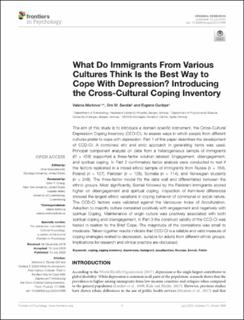| dc.contributor.author | Markova, Valeria | |
| dc.contributor.author | Sandal, Gro Mjeldheim | |
| dc.contributor.author | Guribye, Eugene | |
| dc.date.accessioned | 2021-02-22T09:34:33Z | |
| dc.date.available | 2021-02-22T09:34:33Z | |
| dc.date.created | 2020-08-03T09:11:58Z | |
| dc.date.issued | 2020 | |
| dc.Published | Frontiers in Psychology. 2020, 11 1-17. | |
| dc.identifier.issn | 1664-1078 | |
| dc.identifier.uri | https://hdl.handle.net/11250/2729401 | |
| dc.description.abstract | The aim of this study is to introduce a domain-specific instrument, the Cross-Cultural Depression Coping Inventory (CCD-CI), to assess ways in which people from different cultures prefer to cope with depression. Part 1 of this paper describes the development of CCD-CI. A combined etic and emic approach in generating items was used. Principal component analysis on data from a heterogeneous sample of immigrants (N = 458) supported a three-factor solution labeled: Engagement, disengagement, and spiritual coping. In Part 2 confirmatory factor analysis were conducted to test if the factors replicated in a mixed ethnic sample of immigrants from Russia (n = 164), Poland (n = 127), Pakistan (n = 128), Somalia (n = 114), and Norwegian students (n = 248). The three-factor model fits the data well and differentiated between the ethnic groups. Most significantly, Somali followed by the Pakistani immigrants scored higher on disengagement and spiritual coping. Inspection of item-level differences showed the largest ethnic variations in coping behavior of communal or social nature. The CCD-CI factors were validated against the Vancouver Index of Acculturation. Adoption to majority culture correlated positively with engagement and negatively with spiritual Coping. Maintenance of origin culture was positively associated with both spiritual coping and disengagement. In Part 3 the construct validity of the CCD-CI was tested in relation to the Brief Cope. The magnitude of the correlations was small to moderate. Taken together results indicate that CCD-CI is a reliable and valid measure of coping strategies related to depression, suitable for adults from different ethnic groups. Implications for research and clinical practice are discussed. | en_US |
| dc.language.iso | eng | en_US |
| dc.publisher | Frontiers Media | en_US |
| dc.rights | Navngivelse 4.0 Internasjonal | * |
| dc.rights.uri | http://creativecommons.org/licenses/by/4.0/deed.no | * |
| dc.title | What Do Immigrants From Various Cultures Think Is the Best Way to Cope With Depression? Introducing the Cross-Cultural Coping Inventory | en_US |
| dc.type | Journal article | en_US |
| dc.type | Peer reviewed | en_US |
| dc.description.version | publishedVersion | en_US |
| dc.rights.holder | Copyright 2020 Markova, Sandal and Guribye. | en_US |
| dc.source.articlenumber | 1599 | en_US |
| cristin.ispublished | true | |
| cristin.fulltext | original | |
| cristin.qualitycode | 2 | |
| dc.identifier.doi | 10.3389/fpsyg.2020.01599 | |
| dc.identifier.cristin | 1821237 | |
| dc.source.journal | Frontiers in Psychology | en_US |
| dc.source.40 | 11 | |
| dc.identifier.citation | Frontiers in Psychology. 2020, 11, 1599. | en_US |
| dc.source.volume | 11 | en_US |

